Energy access and climate change have long been important themes in the African Union – European Union strategic partnership. These themes have again been emphasised as a central pillar of cooperation between the two regions in recent meetings between the African Union Commission and the European Commission, as well as the European Commission’s communication ‘Towards a Comprehensive Strategy with Africa’. As Africa and Europe work towards an updated partnership strategy, the context of the COVID pandemic cannot be ignored – the pandemic represents an immense shock to social and economic systems and, beyond the immediate and evident social and economic costs, this is certain to have far-reaching systemic impacts that will shape processes related to economic development and the green transition.
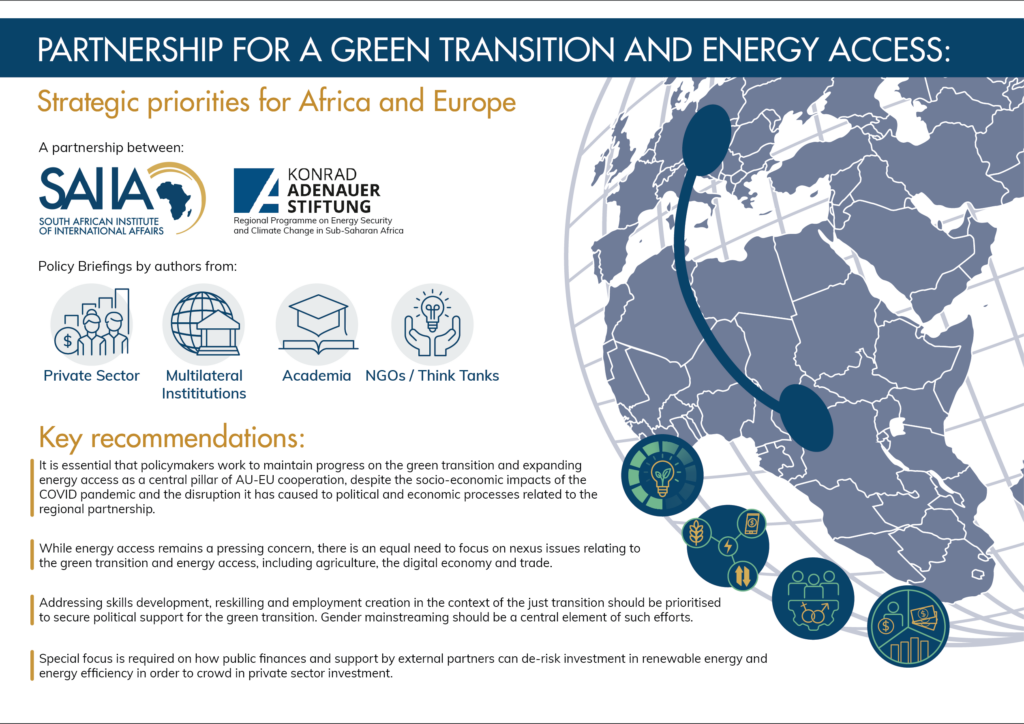
There is also a broader context that preceded the emergence of the COVID pandemic, yet remains central to the debate around AU-EU partnership on the green transition and energy access: the implementation of the Paris Agreement and achieving the Agenda 2030 Sustainable Development Goals; Africa’s growing economic dynamism, paired with ongoing developmental challenges, including low levels of energy access; lowering costs and rapid uptake of renewable energy technologies, while at the same time fossil fuel resources continue to be exploited and remain a key part of many countries’ energy plans; questions around managing a ‘just transition’, particularly as it relates to reskilling and employment; and the implications of stranded assets for countries with fossil fuel reserves.
The project Partnership for a Green Transition and Energy Access: Strategic priorities for Africa and Europe seeks to amplify African perspectives on the green transition and energy access ahead of the next AU-EU Summit. It is a partnership between SAIIA and the Konrad Adenauer Stiftung’s Regional Programme on Energy Security and Climate Change in Sub-Saharan Africa. The key outputs are a series of 10 briefings, together with a synthesis briefing that presents key policy messages of the series. Authors included stakeholders working in African regional institutions, universities, think tanks, as well as the private sector. While African authors were prioritised, perspectives from European researchers working on themes related to the green transition and energy access in Africa were also included.
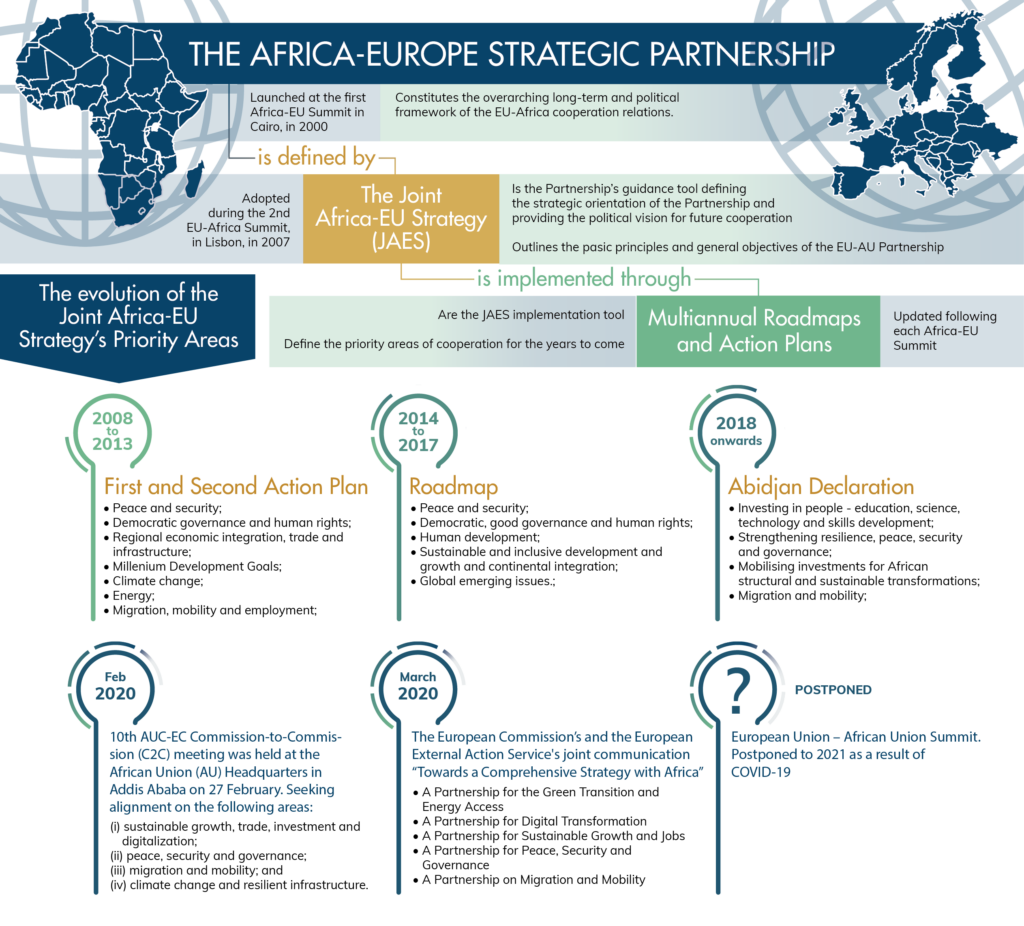
Below is a list of the policy briefings produced in this series:
Partnership for a Green Transition and Energy Access: Strategic priorities for Africa and Europe
This briefing presents key insights from a wider set of briefings produced through the project Partnership for a Green Transition and Energy Access: Strategic priorities for Africa and Europe. The project is a partnership between SAIIA and the Konrad Adenauer Stiftung’s Regional Programme on Energy Security and Climate Change in Sub-Saharan Africa. It sought primarily to amplify African perspectives on the green transition and energy access ahead of the upcoming EU-AU Summit. The briefing considers the impact of the COVID pandemic for the developing AU-EU partnership and highlights key policy messages emerging from the briefing series.
Authors: Alex Benkenstein and Romy Chevallier. Alex is Programme Head of the Governance of Africa’s Resources Programme at the South African Institute of International Affairs (SAIIA). His research interests span climate change, ocean governance, extractive industries governance and more broadly resilience and transitions in African socio-ecological systems. Romy is a Senior Researcher in the Governance of Africa’s Resources Programme at SAIIA, where she leads the Institute’s work on climate and environment. Her research interests cover various dimensions of climate change (international climate diplomacy, ecosystem-based and community-based adaptation, climate and development) as well as livelihoods-based approaches to development, integrated coastal zone governance, and Africa-Europe relations.
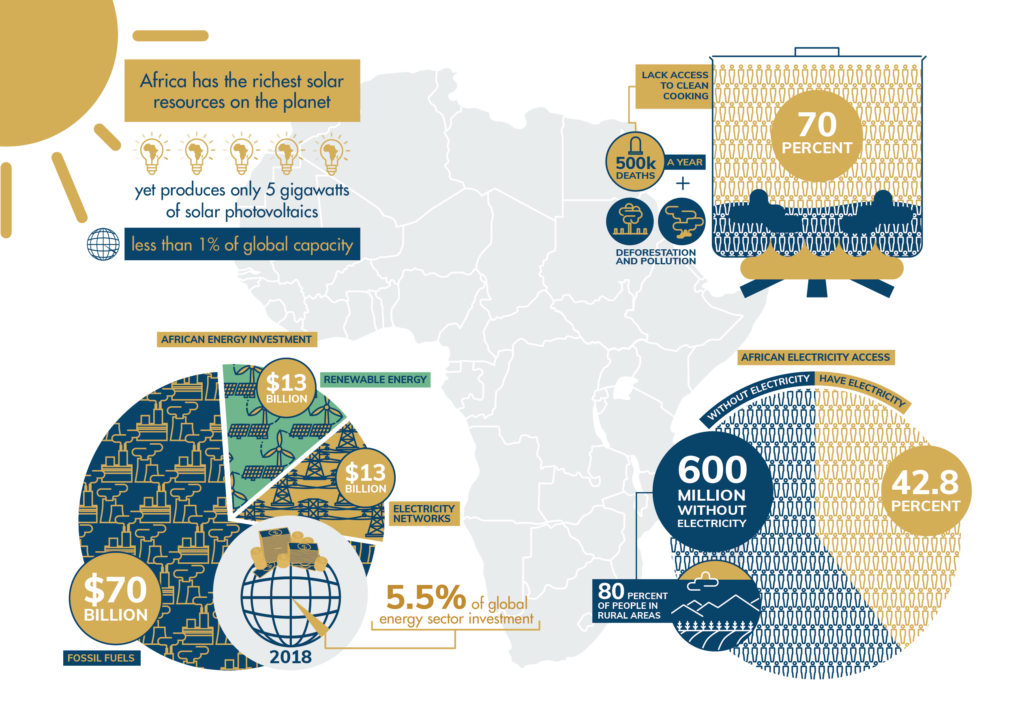
Accelerating Green Energy Transition in Africa through Regional Integration
This brief examines the challenges towards green energy transition in Africa and the prospect of regional integration in fast-tracking this process. Regional integration as being proposed among African countries can sidestep some of the constraints that countries, individually, face in the areas of finance, human capital and technology needed for transition. The study also reflects on the proposed Africa-Europe partnership as an important tool to strengthen this effort with support for regional integration and access to finance and innovations needed for green energy adoption.
Authors: Adedeji Adeniran and Chukwuka Onyekwena. Adedeji is the Director of Education and Governance Research at the Center for the Study of the Economies of Africa (CSEA). His research focuses on sustainable development, public economics, data governance and experimental economics. Chukwuka is the Executive Director of CSEA. He is also the chair of the Advisory Board of Africa Portal, a member of the Steering Committee of the Southern Voice, and a member of the African Policy Circle. His research interests include Foreign Direct Investment (FDI), trade, global economic governance, education quality, energy, agricultural productivity and financial inclusion.
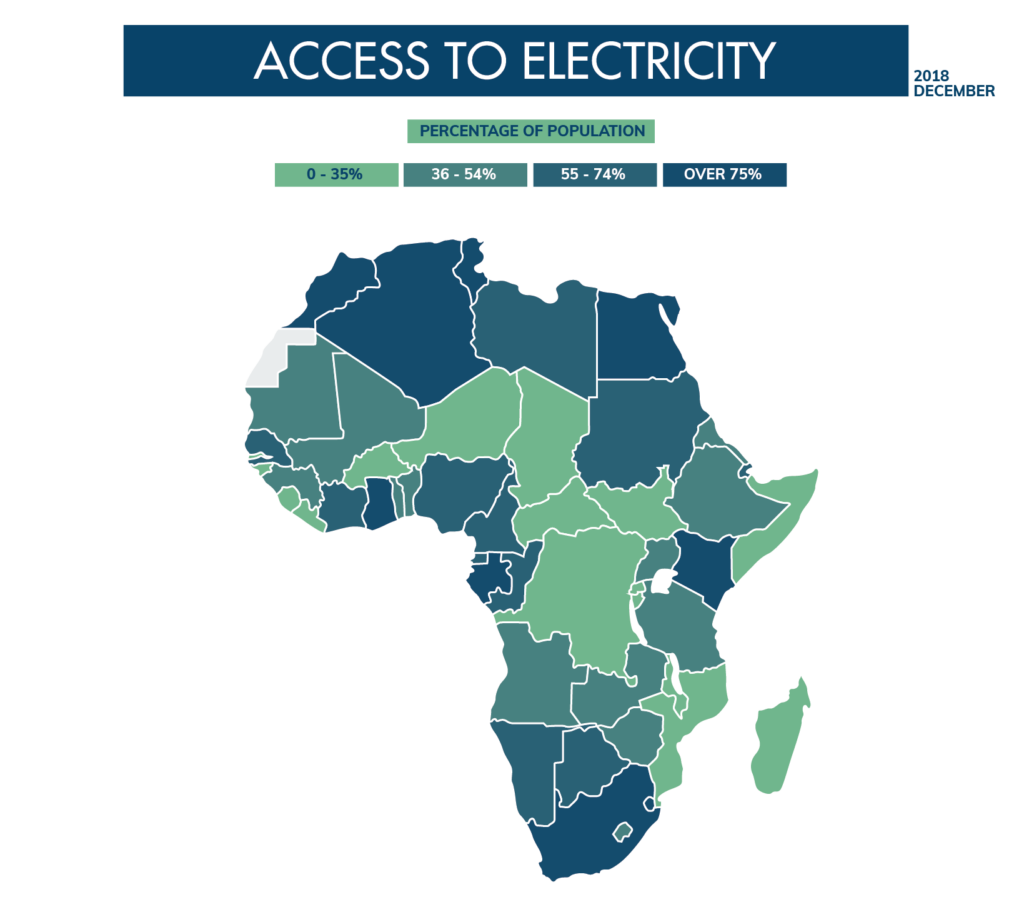
Building Resilience in Africa: Enabling an inclusive digital economy and energy access for all
Unrestricted access to the digital economy is a critical value-added energy service and will help build resilience to the multiple crises the world is experiencing today. The socio- economic crisis arising from the COVID-19 global health pandemic has brought existing vulnerabilities to various crises and shocks of the African continent, and the underlying factors that drive these, into uncomfortably sharp focus. High levels of vulnerability – or low levels of resilience – are concomitant with low access to critical energy services. Central among these is the digital economy, which allows access to socially distanced, and thus safer, socio-economic activity. An inclusive digital economy is, by necessity, underpinned by decentralised energy solutions that are central to socio-economic resilience and are in line with the AU-EU partnership objectives. Cooperative decision-making by AU-EU policymakers should be predicated on achieving open and inclusive access to the digital economy across Africa. The pathways for accelerating inclusive access to all critical energy services must make these affordable, predictable and reliable, thus enabling enhanced quality of life and supporting livelihoods across the continent.
Authors: Belynda Petrie and Anaïs Marie. Belynda has over 18 years’ experience in development cooperation, focusing on sustainable energy, water and climate change and finance, including green growth. She is the CEO of OneWorld, a sustainable development consultancy. Anaïs is a young professional working on urban resilience and sustainable development and in that capacity provides research and analysis for various projects on urban resilience, multi-level governance, and climate finance.
Can Africa’s Contested Energy Futures Create Opportunities for Enhancing EU-Africa Relations?
The challenge of defining African energy futures gains complexity as local politics interact with geopolitical powers and global climate change concerns. The AU-EU strategy focuses on ‘innovation for green transitions’, while European companies continue to dominate African fossil fuel markets. The Chinese strategy to decarbonise their domestic markets encouraged Chinese coal industries to build abroad.
How can African societies define their own energy futures without turning into ‘living sustainability labs’ or stepping into debt traps set out by foreign actors? African agency, open dialogue, transparency, evidence- based decision making and inclusive innovation can enable beneficial change that avoids foreign exploitation.
Author: Britta Rennkamp. Britta is a senior researcher at the African Climate and Development Initiative (ACDI), University of Cape Town. Her research focuses on climate policy and technology in developing countries and the links between poverty, inequality, energy and climate change.
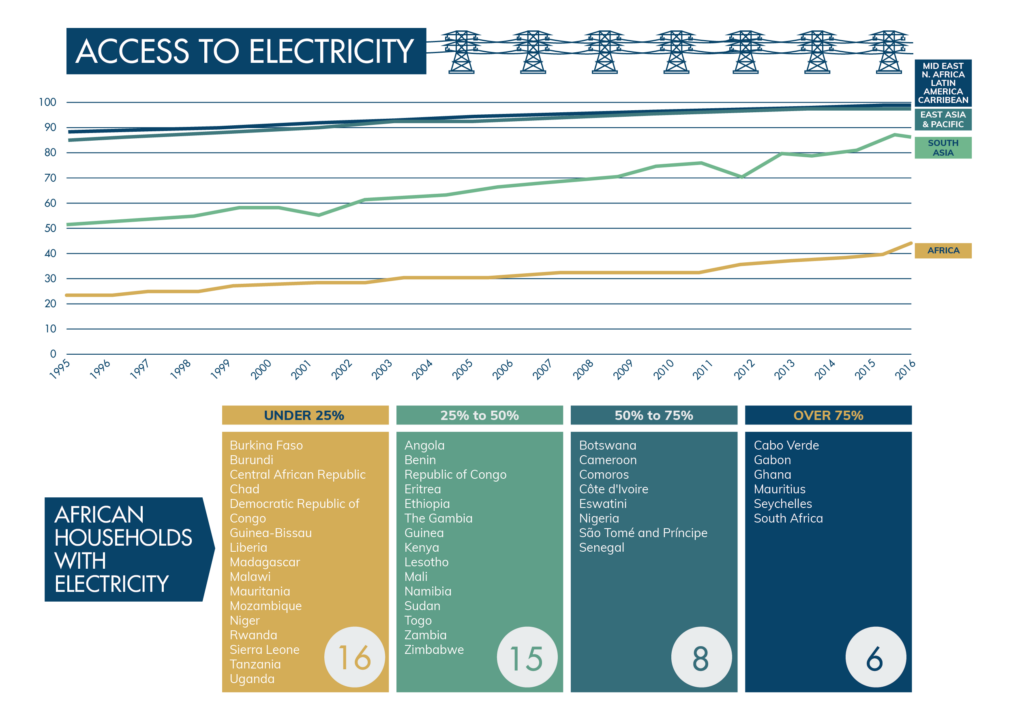
Building Africa’s Renewable Energy Future: Recommendations for a Just Transition
To shed light on the course of African energy transition processes, this policy brief provides evidence from a comparative analysis of 34 African countries. We present a clear picture of promising policy frameworks and fruitful attempts to realise a higher level of energy justice. South Africa, Rwanda, Kenya, Mauritius, Ethiopia and Egypt may serve as good practice examples for other states currently aiming at a systemic energy transition. Our recommendations for AU-EU cooperation on renewables and a green economy bring in suggestions for further fostering this green paradigm shift through means of consultancy, capacity building and strategies for technology transfer.
Authors: Franziska Müller, Simone Claar, Manuel Neumann and Carsten Elsner. Based at the Universities of Hamburg and Kassel, Franziska, Simone, Manuel and Carsten form part of a research group on African energy transitions.
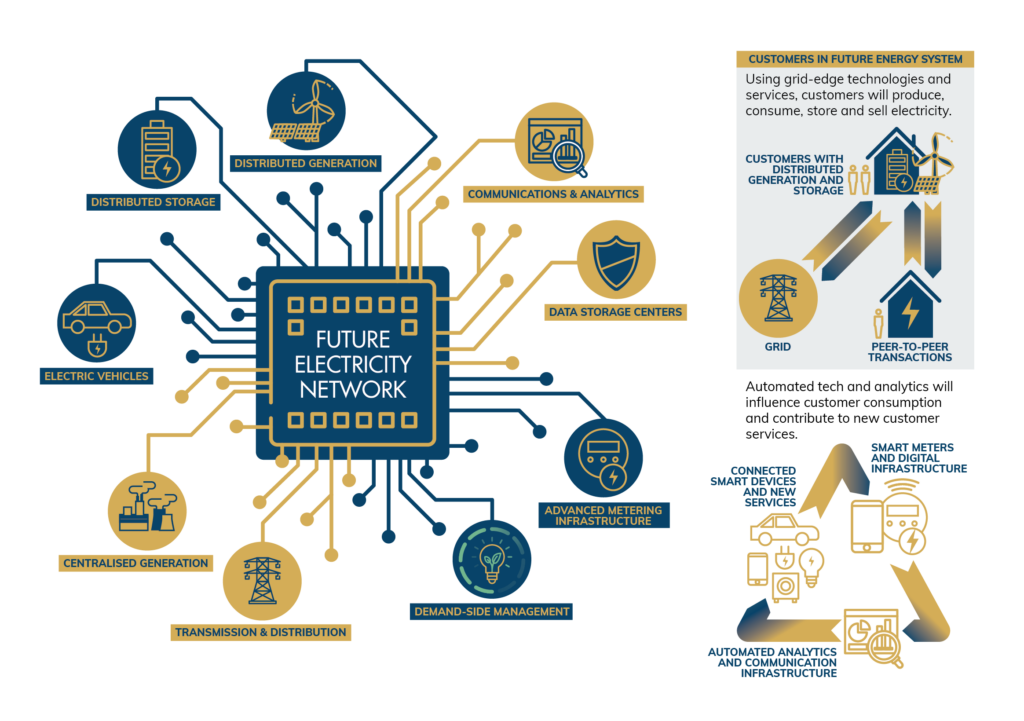
AU-EU Partnership to Promote Sustainable Energy Transitions
The EU Commission has made carbon neutrality its new flagship project. Cooperation on climate change is also becoming increasingly central in the EU’s partnership with African countries. This policy brief argues that an AU-EU partnership on green energy transitions offers manifold opportunities for both regions: for Africa, new job opportunities, increased energy access and revenues through energy trade are possible, while for the EU, green energy demand could be partly covered through cooperation with Africa. Yet, challenges have to be addressed: phasing-out fossil fuels is critical for fossil-fuel dependent countries and the EU is not in the position to demand that resource-rich developing countries keep their fossil fuel reserves unexploited. Instead, it should provide tailor-made incentives through infrastructure finance, technology transfer and education and training. Importantly, diplomatic sensitivity is required and stakeholders should engage timeously to formulate an African-European vision for a joint transition to sustainability.
Authors: Gabriela Iacobuta and Maximilian Högl. Maximilian and Gabriela are researchers at the German Development Institute (DIE). Gabriela focuses on climate mitigation and sustainable development policy worldwide, while Maximilian works on EU climate and development policy.
Skills Transfer and Women in Africa’s Green Transition
Women remain under-represented in energy value chains, and this is true also for the Africa region. While a range of policies and initiatives are being implemented to promote gender mainstreaming in the energy sector, there is a need to focus on effective implementation and the necessary support to ensure that these policies result in tangible changes in the energy sector. Gender dimensions of the green transition are reflected to an extent in AU-EU strategic frameworks and partnerships, yet there are important opportunities to strengthen this element of the regional partnership.
Authors: Grace Murungi and Alex Benkenstein. Grace is a senior electrical engineer with technical expertise leading power development projects in renewable energy and oil and gas sectors in six sub-Saharan African countries. Her interests include sustainable power generation and performance optimization. Alex is Programme Head of the Governance of Africa’s Resources Programme at SAIIA. His research interests span climate change, ocean governance, extractive industries governance and, more broadly, resilience and transitions in African socio-ecological systems.
Innovative Green Financing for Energy Access: Insights from Kenya
With Africa’s continued economic growth, rapid urbanisation and fast population growth, energy demands are expected to increase exponentially. To meet these demands, governments have placed energy investments among their top priorities, with a special focus on renewable energy sources. Public funds alone are however not enough to meet the scale of investment required, hence the need for innovative and additional sources of financing. Green financing offers new opportunities for scaling up public and private investments in renewable energy generation across Africa. This policy brief explores the catalytic role green financing can play in blending public sector funds with private sector capital for renewable energy projects. Using Kenya as an example, it highlights key elements for success in implementing blended finance in renewable energy projects, as well as associated policy reforms and incentive structures.
Authors: Olufunso Somorin and Muthoni Nduhiu. Olufunso is a Regional Principal Officer at the African Development Bank. He leads the Bank’s work on climate change and green growth across its East Africa portfolio of 13 countries. He holds a PhD in International Environmental Policy from Wageningen University, the Netherlands. Muthoni is a Climate Finance Specialist at the African Development Bank, supporting East Africa Regional Member Countries access climate finance to implement their commitments under the Paris Agreement.
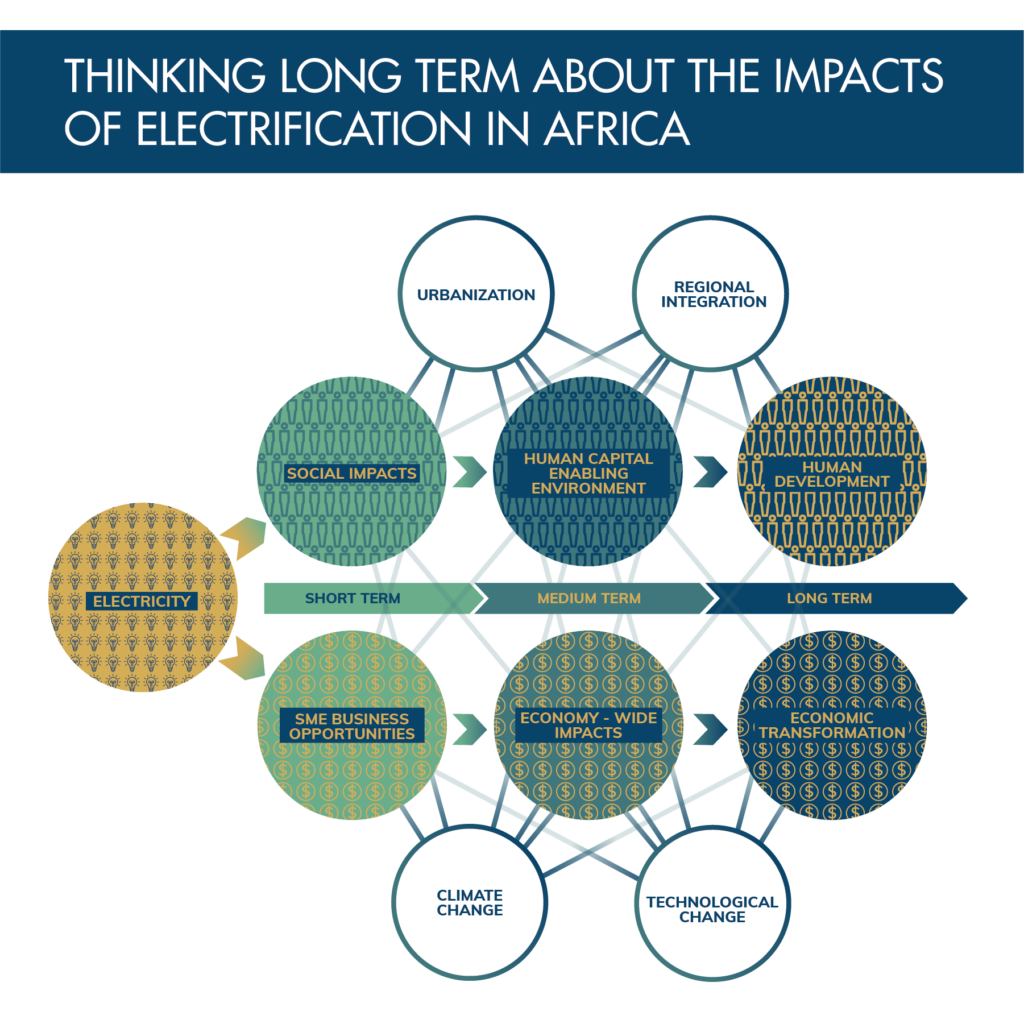
Promoting Private Financing for Sustainable Energy in Africa: The role of the Africa Energy Guarantee Facility (AEGF)
The AU-EU partnership has evolved over the past few years. In line with the global development agenda, the EU has placed climate change and environmental sustainability at the heart of its development policies. The EU’s policies towards Africa are also rapidly changing to incorporate the green economy as a basis for structural economic transformation in the continent. In this light, this brief assesses the prospects and challenges of the Africa Energy Guarantee Facility (AEGF), a newly launched European Investment Bank risk mitigation instrument for sustainable energy projects in Africa. The brief argues that the facility possesses significant opportunities for economic cooperation and development for both Africa and Europe. It will leverage the EU’s position as the largest investor in Africa and encourage private investment in Africa’s renewable energy sector, while also supporting the development of the continent’s financial sector.
Author: Oluwasola Emmanuel Omoju. Oluwasola is a Research Fellow in the Department of Economic Development and Social Studies of the National Institute for Legislative and Democratic Studies (National Assembly), Abuja, Nigeria.
Powering Agriculture: Unlocking Africa’s next green revolution
The economic impacts of the COVID-19 pandemic exacerbate uncertainty around the future of work in Africa. The impact of climate change on Africa’s largely rain-fed agricultural sector only deepens the growing food crisis and compounds the employment challenge. Africa has the lowest agricultural productivity per capita across the world, due in large part to a severe lack of investment at the level of the smallholder farmer. This represents major latent job creation and food security potential, which can be unlocked through fast, affordable access to key productivity inputs, including electricity. The question is: how? The Powering Agriculture campaign was launched in 2019 to help fill the agriculture-energy nexus knowledge gap and better inform public-private partnership action. This policy briefing highlights three key, practical policy recommendations for mobilising Africa’s next green revolution.
Author: Rebekah Shirley. Rebekah is the Chief of Research at Power for All, exploring integrated electrification. A former Chancellor’s Fellow at the University of California, Berkeley, Rebekah now lives in Nairobi, Kenya.
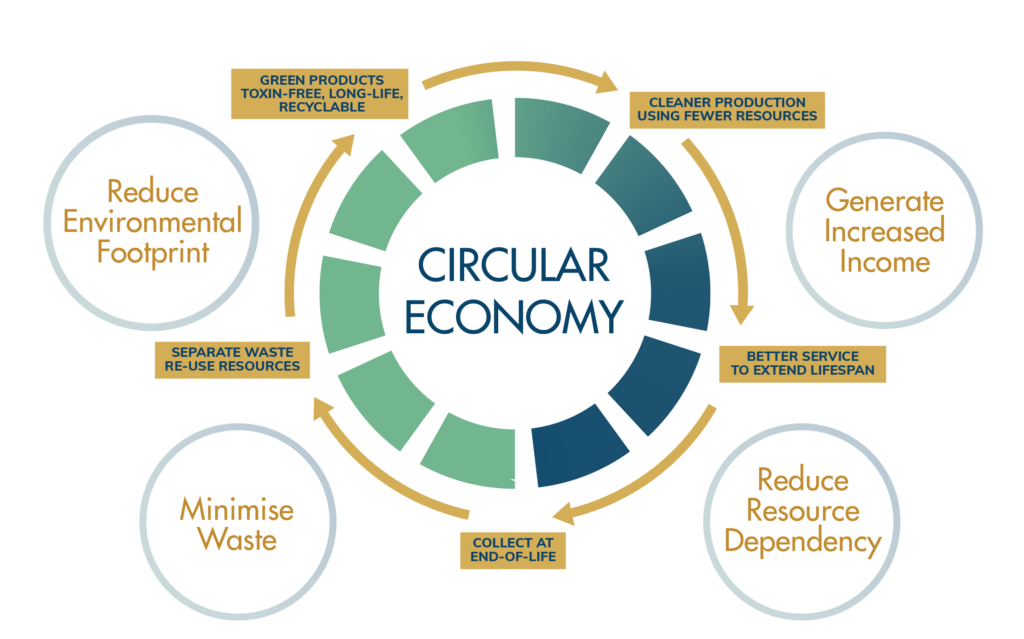
The Circular Economy: Including Africa in Europe’s
The circular economy approach to sustainable economic development has in recent years gained traction and is now included in the European Union’s Green Deal committing the EU to becoming carbon neutral by 2050. African countries practise aspects of the circular economy without having specific policies included in their national development plans.
It was expected that the EU and the AU would have met in 2020 for their triennial summit but the COVID-19 pandemic has forced the two partners to postpone the meeting. The circular economy was to be discussed as part of the EU’s ‘Towards a Comprehensive Strategy with Africa’. This policy brief discusses the circular economy within the context of the COVID-19 pandemic and prospects for a green economic recovery for both the EU and the AU. Although the pandemic has had a devastating impact on both partners, there are strong arguments that the EU should not lose sight of its carbon neutrality targets and that Africa will do well to also focus on the circular economy for its recovery plans.
Author: Talitha Bertelsmann-Scott. Talitha is senior independent consultant working on a range of topics including regional integration in Southern and Eastern Africa, trade policy and the European Union and its relationship with Africa. She is also considered and monitoring and evaluation expert.
(Infographics: Matthew Griffiths)


